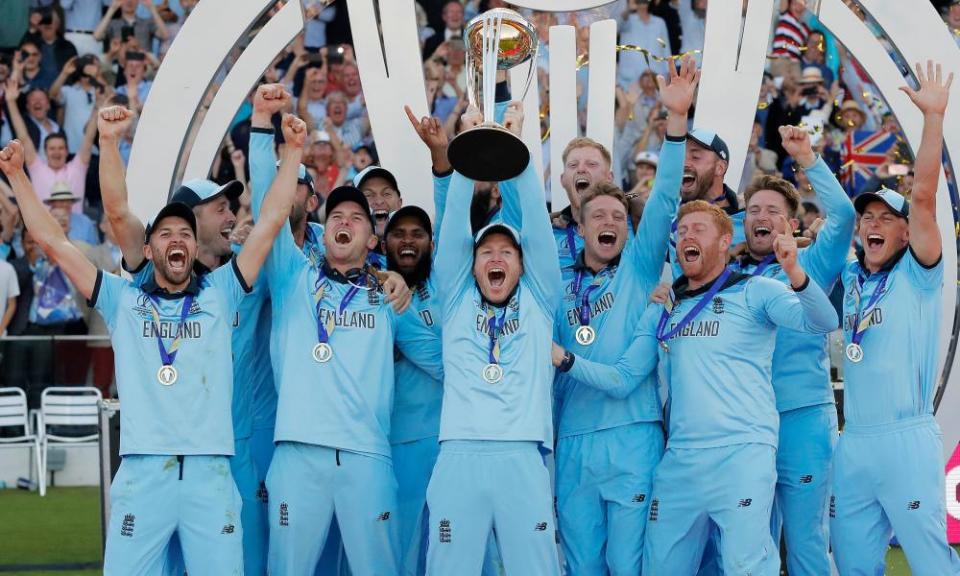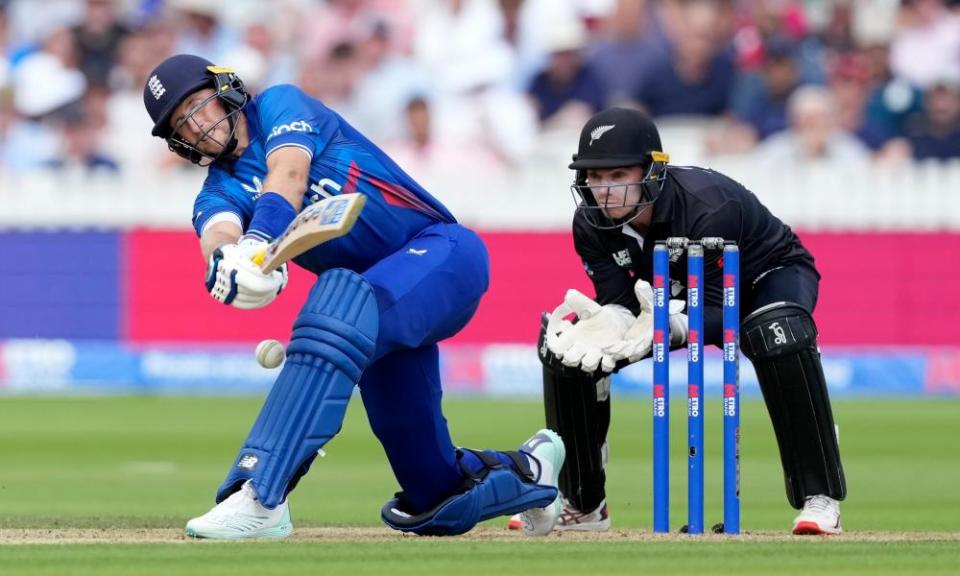
Less than a year out from the Cricket World Cup defence that starts in India next week, Jos Buttler stood on the outfield of the MCG, surveyed the wreckage of a 3-0 defeat to Australia, and admitted he “wasn’t too fussed” by the result.
Another time, another place, these words might have caused a stink; tantamount to a resignation letter for an England captain. But pretty much everyone agreed or at least sympathised considering this unloved and poorly-attended one-day international series had started just four days after Buttler lifted the T20 World Cup on the same ground.
By the same token, it wasn’t exactly a one-off by way of broader sentiment. Sure, Buttler was knackered and eyeing the departure lounge, England’s only real objective on tour achieved. But ever since he ran out Martin Guptill at Lord’s on 14 July 2019, the fulfilment of a four-year World Cup moonshot, 50-over cricket has become an inconvenient obligation in English eyes; the sporting equivalent of a kid being forced to eat their greens.
Related: Ben Stokes: ‘I don’t think it’s arrogance to say we’re a very good team’
There has, it should be noted, been a reduction in bilateral one-day cricket across the world during this last cycle. The 10 teams who featured in the 2019 World Cup played a combined 438 ODIs during the previous four years, compared to 277 by the current 10 since. But England have not only pared back their 50-over commitments, they have practically accepted a decline in results with it.
The numbers tell part of the story. In the four years leading up to the 2019 World Cup a consistent team was grooved under Eoin Morgan, playing 88 ODIs, deploying 34 players but seeing a central core of 13 bank between 40 and 83 caps per man.
Morgan’s pioneers won 15 of 20 bilateral series and climbed to No 1 in the rankings, raiding 48 centuries along the way and setting all manner of new benchmarks including record totals, record run-chases and a previously unseen run-rate of 6.29 per over.
The caps have been sprinkled more liberally since, 44 players used across 42 ODIs. England won seven of their 14 bilateral series, two of which came against Ireland and the Netherlands. Only one series was longer than three matches – the recent 3-1 victory over New Zealand – compared to 13 of four games or more in the previous period. With just 18 centuries in this time, only their run-rate (6.2) has stayed the same.

Jason Roy won the most caps in the latter period – 32 ODIs – but is now a reserve for the upcoming defence of the 50-over title, usurped by the surging form of Dawid Malan and Harry Brook’s flexibility from the bench. The shift is probably best summed up by Joe Root, who played 78 ODIs between 2015 and 2019, averaging 58 with the bat, but just 19 since. England’s second-highest run-scorer in the format has also not added to his 16 centuries in that time.
The ambivalence also extends to the domestic level and the One-Day Cup. Lengthened from 40 overs to 50 in 2014 to mirror the international game, and then twice moved to the early summer months to assist with preparation for global tournaments, it has become a second-tier, quasi second XI competition ever since the advent of the Hundred.
Only one member of England’s current World Cup squad has played in the One-Day Cup in the last four years, Gus Atkinson, the rookie fast bowler, turning out twice for Surrey in 2021. As such it has largely been a return to the tried and trusted, with eight survivors from 2019 in the current squad and the rest picked on T20 exploits.
On paper this could be viewed as a pretty startling decline; the kind that would set alarm bells ringing before the big push. England have dropped to fifth in the ODI rankings and you have to go back to 1996 for the last World Cup winner from outside the top two, that revolutionary Sri Lanka team starting their campaign in sixth.
And yet despite all this, and the fact that the last three World Cups have been won by the home side (something that may prompt New Zealanders to grumble about boundary countback), England still go into the tournament as second favourites with the bookmakers.
This reflects the bigger picture, something England have seen all along. They have made a pragmatic decision, driven initially by the pandemic and its resulting fixture squeeze but also the biennial T20 World Cup offering two cracks at further silverware in the meantime. Morgan’s men missed out in 2021, beaten semi-finalists, but in Australia a year later under his replacement, Buttler, they created a sense of legacy for their white-ball set-up.
With the Test team remaining the flagship for the sport in England, laden with fixtures and needing some TLC in recent times, and franchise T20 leagues factored into player workloads (despite central contracts), essentially something had to give. The one-day team was that something, practically placed on rations by way of playing resources until a full strength squad was finally assembled to face New Zealand at the start of the month.
The question now, as England prepare for their curtain-raising fixture against the Black Caps in Ahmedabad on Thursday with warm-up games against India and Bangladesh, is whether any of this matters; whether the winning habit they transferred to T20 cricket in the intervening years can be easily switched back to its longer sibling.
It certainly differs from this year’s favourites, India. The hosts may draw players from the well of the Indian Premier League but they have played 66 ODIs since their semi-final exit in 2019, hitting a winning groove and overtaking Pakistan at the top of the rankings. And in contrast to Root, for example, their batting kingpin – Virat Kohli – has played 45 of them.
Related: Rushing Jofra Archer’s England return would risk ‘serious ramifications’
But in England’s favour is the phrase coined by Dan Christian during the Australian’s globe-trotting, trophy-laden T20 career when he remarked: “Old blokes win stuff”. The defending champions have an abundance of greybeards in their 15-man squad, with 11 players north of 30 and a combined 971 ODI caps.
The totemic Ben Stokes is among them after last year’s slightly hasty one-day retirement – another sign of the format’s diminished status in English eyes – was reversed. Stokes may be a specialist batter, that knee preventing him bowling, but his cross-format form has been destructive this year and no side will consider England beaten until his wicket falls.
Buttler’s squad looks to have a strong balance, a powerful batting lineup that runs deep and a bowling attack that – assuming Mark Wood and Adil Rashid recover from recent niggles – has variety, with pace, wrist-spin, finger spin and three left-armers. Subcontinental conditions, once kryptonite to English cricketers, are well-known to all but young Atkinson.
All things considered, and despite head coach Matthew Mott insisting there are “no expectations”, missing out on a semi-final berth in this World Cup would be a disappointment. From there anything is possible, such is the capricious nature of knockout cricket, but England’s place among the leading contenders is still justified.
Indeed, the impact of all of the above may not truly be known until the next crop of players step up; whether a generation nursed on T20 and 100-ball cricket alone will be able to thrive when presented with the broader, less familiar canvas of 50 overs.
For the next seven weeks it is chiefly a case of getting the band back together and trusting that the same sweet music will follow.
Article courtesy of
Source link